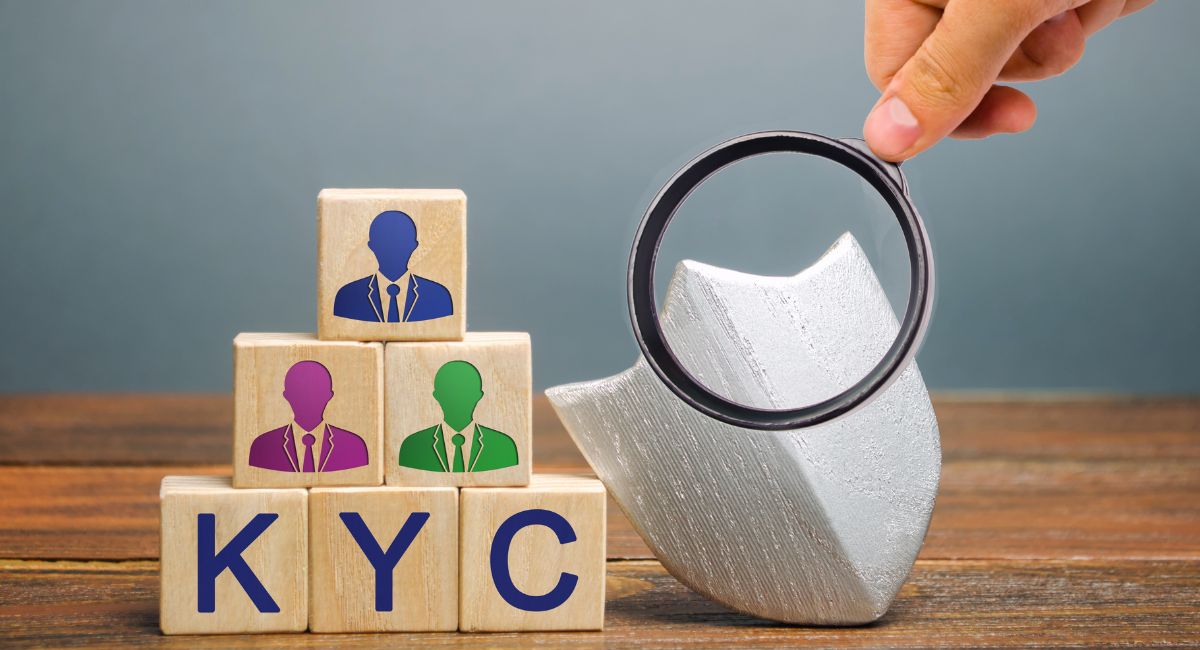Top 10 KYC Compliance Considerations For DeFi Companies

Defi, or Decentralized Finance, is a burgeoning financial system built on blockchain technology. It aims to bypass traditional financial institutions like banks by enabling individuals to directly participate in various financial activities peer-to-peer. Imagine a financial marketplace where everyone can borrow, lend, invest, and trade, facilitated by self-executing code called smart contracts on the blockchain.
At the core of DeFi are smart contracts, self-executing code deployed on blockchain networks that facilitate various financial functions, including lending, borrowing, trading, and yield farming. These smart contracts enable users to interact directly with decentralized protocols without the need for intermediaries, thereby reducing costs, increasing accessibility, and eliminating counterparty risk.
One of the most prominent use cases of DeFi is decentralized lending and borrowing. Through platforms like Compound, Aave, and MakerDAO, users can lend out their crypto assets and earn interest or borrow assets by collateralizing their holdings, all without relying on traditional financial institutions. This opens up access to financial services for individuals who may not have access to traditional banking services or who prefer to avoid the restrictions and fees associated with centralized intermediaries.
DeFi also encompasses decentralized exchanges (DEXs), which allow users to trade cryptocurrencies directly with one another without the need for a centralized order book or custodial services. Platforms like Uniswap, SushiSwap, and Balancer enable users to swap tokens, provide liquidity to liquidity pools, and earn trading fees, all while maintaining control of their assets.
DeFi has expanded to include various other financial primitives, such as decentralized derivatives, prediction markets, insurance, and asset management services. These innovative applications offer new ways for users to access and interact with financial markets, providing opportunities for yield generation, risk management, and portfolio diversification.
It’s important to note that DeFi is still in its early stages and faces challenges such as scalability, security vulnerabilities, and regulatory uncertainty. Despite these challenges, DeFi continues to attract significant interest and investment as it demonstrates the potential to revolutionize the traditional financial system by creating a more inclusive, efficient, and transparent financial infrastructure powered by blockchain technology.
Also, read- Top 7 Amazing Ways DeFi Startups Can Make Use Of Web3 Fundamentals
What is KYC Compliance?

KYC, short for Know Your Customer, refers to a set of regulations and procedures financial institutions and other regulated entities must follow to verify the identity and assess the risks associated with their customers. It’s a crucial component of Anti-Money Laundering (AML) and Combating the Financing of Terrorism (CFT) efforts.
Here’s a breakdown of KYC compliance:
Purpose:
- Prevent Money Laundering: KYC helps identify and stop individuals or organizations from using financial services to disguise the illegal origin of funds.
- Combat Terrorist Financing: It aims to prevent the financing of terrorist activities by identifying high-risk individuals or groups.
- Mitigate Fraud: KYC helps institutions identify and prevent fraudulent activities such as identity theft and financial scams.
Process:
- Customer Identification: This involves collecting personal information like name, address, date of birth, and government-issued ID verification.
- Customer Due Diligence (CDD): This entails assessing the customer’s risk profile by evaluating their source of income, nature of business, and transaction activity.
- Ongoing Monitoring: Institutions are required to monitor customer activity and update their information periodically to ensure continued compliance.
Benefits:
-
Risk Mitigation: KYC helps mitigate financial, legal, and reputational risks by ensuring that businesses understand the identities of their customers and the nature of their activities. By verifying customer identities, businesses can better assess the risk of fraud, money laundering, terrorist financing, and other illicit activities.
-
Compliance with Regulations: KYC procedures help businesses comply with regulatory requirements, including anti-money laundering (AML), counter-terrorism financing (CTF), and sanctions compliance laws. Compliance with these regulations is essential for avoiding fines, penalties, and legal liabilities.
-
Enhanced Security: KYC procedures enhance the security of financial transactions and prevent unauthorized access to sensitive information. By verifying customer identities, businesses can reduce the risk of identity theft, account takeover, and other security breaches.
-
Protection against Financial Crimes: KYC helps protect businesses and their customers from financial crimes such as fraud, identity theft, and cybercrime. By verifying customer identities and monitoring transactions, businesses can detect and prevent fraudulent activities before they cause financial harm.
-
Customer Trust and Confidence: KYC procedures build trust and confidence among customers by demonstrating a commitment to security, compliance, and integrity. Customers are more likely to do business with companies that prioritize KYC and take steps to protect their interests.
-
Improved Customer Relationships: KYC procedures provide businesses with valuable insights into their customers’ identities, preferences, and behavior. This information can be used to personalize products and services, tailor marketing efforts, and enhance the overall customer experience.
-
Efficiency and Cost Savings: While KYC procedures require upfront investment in technology and resources, they can ultimately lead to long-term efficiency gains and cost savings. By streamlining customer onboarding, reducing manual processes, and automating compliance tasks, businesses can lower operational costs and improve productivity.
-
Access to Financial Services: KYC procedures enable individuals and businesses to access a wide range of financial services, including banking, lending, investment, and insurance products. By verifying customer identities, financial institutions can comply with regulations and offer services to legitimate customers while mitigating the risk of financial crimes.
BUILDAI is Now #KYC ASSURED✨™
— Assure DeFi – #1 Crypto KYC & Audits (@AssureDefi) February 26, 2024
Total Team Members Verified: ⭐️@BuildAI_erc | $BUILD
Welcome to BuildAI: Where innovation meets simplicity in Telegram bot development. Revolutionize bot creation with our user-friendly interface and cutting-edge AI. Let’s build something… pic.twitter.com/mgp9mA5vel
What is the purpose of KYC in Defi companies?

In the realm of decentralized finance (DeFi), Know Your Customer (KYC) compliance is a crucial consideration, albeit within a framework that emphasizes decentralization and user privacy. While traditional financial institutions rely heavily on KYC procedures to verify the identities of their customers, DeFi companies must navigate a unique landscape that balances regulatory compliance with the principles of decentralization and user autonomy.
DeFi companies face the challenge of implementing KYC procedures in a decentralized environment where users have greater control over their assets and interactions. Nevertheless, KYC compliance remains essential for DeFi platforms to establish trust with regulators, financial institutions, and users alike. By implementing robust KYC processes, DeFi companies can mitigate the risk of illicit activities such as money laundering, terrorist financing, and fraud while promoting a safer and more transparent ecosystem.
Key considerations for KYC compliance in DeFi companies include identity verification, risk assessment, transaction monitoring, and privacy protection. DeFi platforms must verify the identities of their users through reliable means such as document verification and biometric authentication, while also implementing risk-based approaches to tailor KYC procedures according to the level of risk posed by different users and transactions. Furthermore, transaction monitoring systems are essential for detecting and reporting suspicious activities, ensuring the integrity of the DeFi ecosystem.
Privacy protection is another critical aspect of KYC compliance in DeFi. While traditional KYC procedures may involve the collection of extensive personal data, DeFi companies must strike a balance between KYC requirements and user privacy. Safeguarding user privacy through limited data collection and compliance with data protection regulations is essential for building trust and maintaining the integrity of DeFi platforms.
In summary, KYC compliance in DeFi companies requires a nuanced approach that acknowledges the unique challenges and opportunities presented by decentralized finance. By implementing robust KYC procedures while respecting user privacy and autonomy, DeFi companies can foster greater trust, transparency, and legitimacy in the rapidly evolving world of decentralized finance.
10 KYC compliance considerations for DeFi companies

- Regulatory Landscape Awareness: DeFi companies must continuously monitor and understand the evolving regulatory landscape to ensure compliance with KYC requirements across jurisdictions.
- Risk-Based Approach: Adopting a risk-based approach allows DeFi companies to tailor their KYC procedures according to the level of risk posed by different users, transactions, and jurisdictions.
- Identity Verification: Implement robust identity verification processes, such as document verification and biometric authentication, to ensure the accuracy and legitimacy of user identities.
- Sanctions Screening: Conduct sanctions screening against global watchlists to identify and prevent interactions with individuals or entities involved in illicit activities.
- Transaction Monitoring: Employ robust transaction monitoring systems to detect and report suspicious activities, including unusual transaction patterns or large transactions inconsistent with a user’s profile.
- Privacy Protection: Safeguard user privacy by limiting the collection and use of personal data to only what is necessary for KYC purposes and ensuring compliance with data protection regulations.
- Automated Solutions: Utilize automated KYC solutions, such as identity verification APIs and blockchain analytics tools, to streamline the KYC process and enhance efficiency while maintaining compliance standards.
- Ongoing Due Diligence: Conduct ongoing due diligence on customers to ensure that their risk profiles remain up to date and to identify any changes that may require additional scrutiny.
- Comprehensive Record Keeping: Maintain comprehensive records of KYC documentation, transaction history, and compliance activities to demonstrate adherence to regulatory requirements and facilitate audits.
- Employee Training and Awareness: Provide regular training and awareness programs to employees involved in KYC processes to ensure they understand their obligations and responsibilities under relevant regulations. This helps in maintaining a culture of compliance within the organization.
Conclusion
In conclusion, navigating Know Your Customer (KYC) compliance within decentralized finance (DeFi) companies presents a complex yet essential challenge. Despite operating in a decentralized environment that prioritizes user autonomy and privacy, DeFi platforms must still adhere to KYC requirements to establish trust with regulators and users and mitigate the risk of illicit activities. By implementing robust KYC procedures that balance regulatory compliance with user privacy, DeFi companies can foster a safer, more transparent ecosystem that promotes financial inclusion and innovation.
Furthermore, as the DeFi landscape continues to evolve, collaboration between industry participants, regulators, and technology providers will be crucial in developing standards and best practices for KYC compliance in a decentralized context. By embracing this collaborative approach and leveraging emerging technologies such as blockchain analytics and decentralized identity solutions, DeFi companies can navigate the complexities of KYC compliance more effectively while upholding the principles of decentralization and user empowerment. Ultimately, the successful integration of KYC compliance into DeFi platforms will be essential for realizing the full potential of decentralized finance and building a more inclusive and resilient financial system for the future.


























































